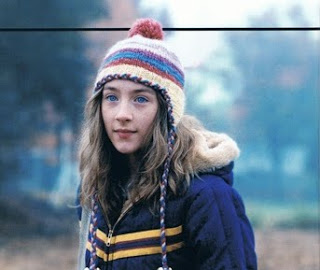I can remember being nine, ten, fourteen, sixteen and every time some new young girl disappeared, no matter where in the world, my grandmother would look at me and say, "This could be you." And I always knew that in theory it could be. Whether it is because the media bombards us with the grisly details of these tragedies or because the world really is less safe these days, girls, even women, cannot really ever feel truly secure.
Peter Jackson doesn't approach this story by genuinely trying to examine the very real fears of young girls, nor does he really achieve a full sense of the horror or grief this kind of tragedy can inflict on a family or community. Instead he spends far too much time following the dead girl Suzie through the endless landscapes of the 'in-between place' (not heaven but not earth), depicted in painful CGI faux-realism. The film takes place in the '70s and in one especially painful moment, Suzie and her dead friend Holly (another victim of her killer) are clad in platform shoes dancing on a record player to disco. I think they may even be wearing tie-dye. Although in parts heaven is pretty, it is also boring and the young actress who plays Holly gives a performance not even worthy of a bad high school play.
The element that rings the most false about the film is that although Jackson is trying to hit one melancholic high note after another and is figuratively jumping through fire to try and tug at our heart strings, it all feels a bit empty. Like the narrator Suzie, who is telling us this story from far away, I felt removed from the emotion of the story. The thing I felt most consistently throughout was discomfort at Jackson's awkward attempt to try to understand and represent the fears of the teenage girl (he fails at both). At best, the film is a third rate Hallmark Hall of Fame made for tv movie crossed with an episode of law and order - at worst it is the sticky, voyeuristic approach of someone who is trying to make teenage girls into some strange ideal - beautiful, thin angels dancing about in gauzy fields of colour. The gaze is uncomfortable and at times feels inappropriate. I'm quite certain that this was not Jackson's intention.
The only slightly redeeming feature of The Lovely Bones was the performance by Saoirse Ronan as the dead girl Suzie Salmon - probably best known for playing the trouble-making Briony in the film adaptation of Atonement a few years back. She doesn't have a lot to work with in The Lovely Bones, but but she does mostly manage to play it straight, despite being forced to deliver line after line of insipid surgary goop. Rachel Weisz, who plays Suzie's bereaved mother, is adequate as are the other supporting children (with the exception of the horrific Holly) but where it really falls apart is with Mark Wahlberg, who plays Suzie's father. Sporting a shag haircut, which is constantly in his face, there are dramatic moments where crazy-eyed Mark doesn't seem to realise he isn't in a Saturday Night Live sketch. I half expected a laugh track to cut in where I should have been feeling sorrow for a father whose favourite daughter was murdered.
Similarly, the usually lovely Susan Sarandon plays an over-the-top character whose only purpose is to distract us from how rubbish we think the film is with her big hair and kookiness. Finally, Stanley Tucci as Suzie's killer is so oily and grim that it is hard to wonder that any of the characters in this film aren't immediately assured that he is the monster in the neighbouhood. All he does for two and a half hours is skulk in dark corners, spy on young girls and build doll houses. He is creepier and more obvious than Golum.
The Lovely Bones was odd, painful and it missed every single mark. The paranoia and pathos so entangled with being a teenage girl in North America is a strange choice for a middle age, male, Kiwi film director, though it could be argued that as Jackson is neither a hobbit nor an inhabitant of middle-earth, yet he created a great series of films out of The Lord of the Rings. It would be interesting to know what pulled him towards this material that so obviously eluded him.
There is a scene in Sophia Coppola's great film The Virgin Suicides (based on a book, which, it should be noted, was written by a middle-age white guy), which really sums up where this film went very wrong for Jackson. Young Cecilia Lisbon is in the hospital after trying to kill herself and the doctor says, "What are you doing here, honey? You're not even old enough to know how bad life gets."
"Obviously Doctor, you've never been a 13-year-old girl."

